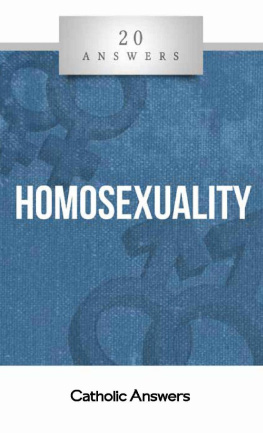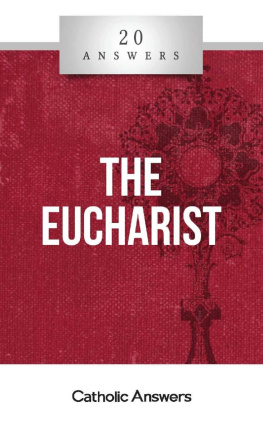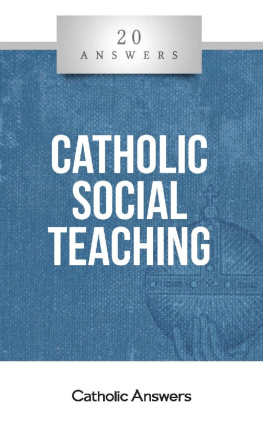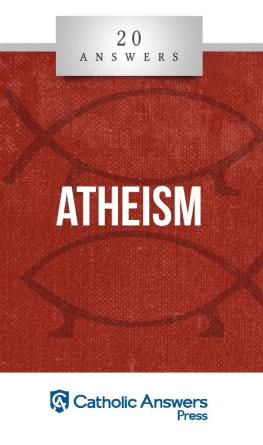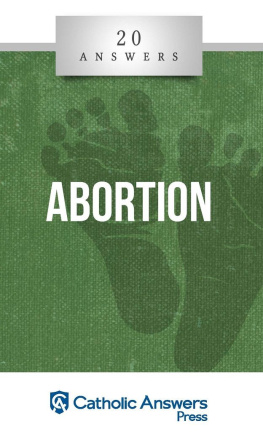Stacy A. Trasancos - 20 Answers- Bioethics (20 Answers Series from Catholic Answers Book 27)
Here you can read online Stacy A. Trasancos - 20 Answers- Bioethics (20 Answers Series from Catholic Answers Book 27) full text of the book (entire story) in english for free. Download pdf and epub, get meaning, cover and reviews about this ebook. year: 2018, publisher: Catholic Answers Press, genre: Religion. Description of the work, (preface) as well as reviews are available. Best literature library LitArk.com created for fans of good reading and offers a wide selection of genres:
Romance novel
Science fiction
Adventure
Detective
Science
History
Home and family
Prose
Art
Politics
Computer
Non-fiction
Religion
Business
Children
Humor
Choose a favorite category and find really read worthwhile books. Enjoy immersion in the world of imagination, feel the emotions of the characters or learn something new for yourself, make an fascinating discovery.

- Book:20 Answers- Bioethics (20 Answers Series from Catholic Answers Book 27)
- Author:
- Publisher:Catholic Answers Press
- Genre:
- Year:2018
- Rating:4 / 5
- Favourites:Add to favourites
- Your mark:
- 80
- 1
- 2
- 3
- 4
- 5
20 Answers- Bioethics (20 Answers Series from Catholic Answers Book 27): summary, description and annotation
We offer to read an annotation, description, summary or preface (depends on what the author of the book "20 Answers- Bioethics (20 Answers Series from Catholic Answers Book 27)" wrote himself). If you haven't found the necessary information about the book — write in the comments, we will try to find it.
20 Answers- Bioethics (20 Answers Series from Catholic Answers Book 27) — read online for free the complete book (whole text) full work
Below is the text of the book, divided by pages. System saving the place of the last page read, allows you to conveniently read the book "20 Answers- Bioethics (20 Answers Series from Catholic Answers Book 27)" online for free, without having to search again every time where you left off. Put a bookmark, and you can go to the page where you finished reading at any time.
Font size:
Interval:
Bookmark:
20 Answers
Bioethics
Stacy A. Trasancos

20 Answers: Bioethics
Stacy A. Trasancos
2018 Catholic Answers
All rights reserved. Except for quotations, no part of this book may be reproduced or transmitted in any form or by any means, electronic or mechanical, including photocopying, recording, uploading to the internet, or by any information storage and retrieval system, without written permission from the publisher.
Published by Catholic Answers, Inc.
2020 Gillespie Way
El Cajon, California 92020
1-888-291-8000 orders
619-387-0042 fax
Printed in the United States of America
978-1-68357-084-4
978-1-68357-085-1 Kindle
978-1-68357-086-8 ePub
Introduction
Mystery is a fact of life, from its beginning to natural end and to its everlasting duration. Unless we were conceived under a hovering eye in a Petri dish, none of us knows exactly when we first began to exist. Biologically, we can deduce that human life begins when the membranes of sperm and egg fuse, but that series of chemical events happens deep within a mothers body days or weeks before she knows, at a moment only known to God.
Death is no less mysterious. Medical professionals define death as the irreversible cessation of circulatory and respiratory functions, or of the entire brain, but biology does not provide us with a distinct marker to indicate when the human organism ceases to be an integrated wholewhen the soul separates from the body. But that is only to say that science cannot tell us everything. Biology cannot even discover all the physical processes that must occur in orchestration at the atomic scale for your heart to beat one more time.
The fact is: no one escapes mystery, not even the atheist who clings to materialism and denies the supernatural. For although he can glean what he can from science, he will always be left unable to deal with what comes before and beyond science. The atheist cannot say why humans want to learn more about living things; he cannot articulate the purpose for existing; he has no way to explain what it means to be human. He cannot, ultimately, define life itself, except to call it whatever he deems it to be. The atheist loses touch with objective truth, and in doing so, forfeits any basis for morality.
The atheists goal is to avoid suffering. For him, ethics amounts to a superficial, emotion-based analysis reverse engineered to fit pre-existing conclusions about what he wants to do, not what he should do. In this booklet, we take the opposite approach. We begin with what God has revealed about the human person and our purpose for existing, and we rigorously step through the logic of bioethics to help us decide how to know what is right and what is wrong in the critical moments of life.
We will address the challenging moral questions a Catholic today faces in the biological and medical sciences and consider the details systematically through the eyes of the Church, as they relate to individual lives, society, and eternity.
1. What is bioethics?
The word bioethics refers to the discipline dealing with ethical issues relating to the practice of, or advances in, medicine and biology.
A professor of oncology at the University of WisconsinMadison for more than fifty years, Potter envisioned a bioethics that refers to the survival of the total ecosystem on Earth. Amid the grip of the Darwinian survival-of-the-fittest reductionist mentality, Potter sought to unite biological discovery with ethical wisdom. He called for a broader knowledge that centers on the human person and explores his responsibility in the world. For Potter, a science of survival meant that we must decipher how to ethically use scientific advances because what is possible is not always morally justifiable.
Potters idea is consistent with Catholic teaching, not only in its view of the human persons significance and obligation, but also in the sense that bioethics is a unity of science, philosophy, and theologythe love of wisdom and practice of virtue to do what is moral in science.
But before Van Rensselaer Potter and biology, before the modern era, before the Renaissance and Middle Ages, back to early Christianity drawn from biblical times, we find that the Church was teaching bioethics even before it was a formal discipline. The Church has always sought to understand the human person and our place in creation, reasoning from the revelation of the Incarnation and the Holy Trinity and carefully navigating ethical issues all the way back to Genesis, where it is codified that humans have dominion over the Earth. God said, Let us make man in our image, after our likeness; and let them have dominion (Gen. 1:26). The Churchs view of bioethics goes further than a secular consideration, however. It extends beyond the mortal human life in context of the Earth to everlasting life granted by our Creator.
The Magisterium of the Church accordingly provides specific guidance on the most difficult bioethical issues such as the beginning of human life, abortion, in vitro fertilization (IVF), stem cell research, vaccines, brain death, organ donation, end-of-life treatment, and euthanasia. As modern biology and medical science forge ahead into uncharted territory, it is more critical than ever that Catholics be prepared to respond to the intersection of faith and science that affects us most: the ethical treatment of the human person.
2. Why is bioethics important?
Biomedical research has allowed for impressive advances in how we live, but those advances also tempt us to go beyond ethical limits to abuse nature. Catholics are called to be informed of the moral law that reflects gospel teaching. In 1987, the Congregation for the Doctrine of the Faith (CDF) issued an instruction titled Donum Vitae (DV) responding to current ethical questions regarding human life. Then-prefect Joseph Cardinal Ratzinger outlined the reasons for Catholics to take responsibility for the gift of life that God the Creator and Father has entrusted to humanity:
1.The Church is an expert in humanity and safeguards the rights of the human person.
2.We have a mission to build and nurture a civilization of love and life.
3.We are called to beatific communion with God and to proclaim the gospel of salvation.
Friends and family members will look to us for guidance on issues involving both the beginning and the end of human life, and we must be prepared to answer their questions.
Why shouldnt I use birth control? Why cant I use IVF if my husband and I cannot get pregnant? Whats wrong with embryonic stem cell research? When is it okay to end the life of an elderly or sick person? Should I agree to be an organ donor?
Furthermore, we must be ready to guide society as biomedical research advances. We are living the experiment, literally. Every day there are new reports of advances toward gene editing, designer babies, human-animal chimeras, artificial intelligence, and transhumanism. The sci-fi ring of these issues is more reason to be secure in the basics. We must do more than prepare responses to questions about these technologies. We must also ask ourselves now what we will do if these technologies advance in ways the Church warns against.
Bioethics, as a science-and-faith integration, is not an academic exercise merely to be pondered while sipping coffee and stroking our chins. It deals with real life, real suffering, real death. Among the various intersections of theology, philosophy, and science, bioethics is the most important.
Bad bioethics produces a civilization where innocent humans are murdered because they are unwanted, either because their existence was unintended or because their usefulness has expired. Children could be produced like commodities for parents who can afford to buy them. Or children could be the best kind of lab rat: actual human bodies produced from gametes (sperm and egg) donated by parents they will never know, made in glassware, grown in controlled environments, used like machinery, and discarded like trash.
Next pageFont size:
Interval:
Bookmark:
Similar books «20 Answers- Bioethics (20 Answers Series from Catholic Answers Book 27)»
Look at similar books to 20 Answers- Bioethics (20 Answers Series from Catholic Answers Book 27). We have selected literature similar in name and meaning in the hope of providing readers with more options to find new, interesting, not yet read works.
Discussion, reviews of the book 20 Answers- Bioethics (20 Answers Series from Catholic Answers Book 27) and just readers' own opinions. Leave your comments, write what you think about the work, its meaning or the main characters. Specify what exactly you liked and what you didn't like, and why you think so.


